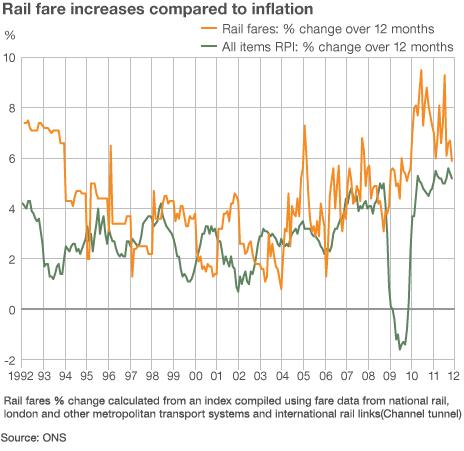Rail fares to rise by 5.9% from January
- Published
- comments
Atoc's Michael Roberts: "People are voting with their feet and their wallets increasingly to travel by train"
Train fares will rise by an average of 5.9% in January 2012, the Association of Train Operating Companies has said.
In his Autumn Statement last month, Chancellor George Osborne capped fare increases at 6%, instead of the expected 8%.
Fare rises are linked to July's inflation, as measured by the Retail Prices Index, which stood at 5%.
Atoc said the fare increase would be used to pay for "new trains, faster services and better stations".
"The long standing government approach to sustaining rail investment is to cut the contribution from taxpayers and increase the share paid for by passengers," said the group's chief executive Michael Roberts.
Currently, passengers contribute about £6.5bn to the running of the railways, with taxpayers picking up the remaining £4bn.
Policy change
The fare increases apply in England, Scotland and Wales, and take effect from Monday 2 January.
About half of all fares are set by the government formula of RPI inflation in July, plus 1%. RPI is currently running at 5.2%.
Campaigner Sophie Allain: "We already have the most expensive rail fares in Europe"
In last year's Spending Review, the government said it wanted to increase this to RPI plus 3%, but last month the chancellor said he would not be implementing this change.
The average increase covers regulated fares such as season tickets for most commuter journeys, and off-peak fares on most intercity trains, Atoc said.
Unregulated tickets include advance tickets and business fares at peak times. Atoc said these fares were "heavily influenced" by government policy.
The increase of 5.9% applies to both regulated and unregulated fares. The fact it is an average means some fares will rise by more than this figure, and some will rise by less.
Customers wanting to know the precise details of fare increases relevant to them should go to National Rail Enquiries, external to see the difference in cost between a ticket now and the same ticket after 2 January, Atoc said.
'Rich toy'
The Labour party criticised the government for allowing fare rises that could be more than 5.9%.
"It's clear that many commuters are facing a fares fiddle thanks to the government's decision to allow train companies to average out the revised fare cap across a range of tickets, meaning many tickets will rise by a shocking 9% in the new year," said Maria Eagle, shadow transport secretary.
In September, the then transport secretary Philip Hammond described UK rail fares as so expensive that trains had become a "rich man's toy".
Atoc said rail journey numbers had increased by 5% in the first nine months of this year, with demand now as high as it has ever been in peacetime since the 1920s.

- Published29 November 2011
- Published27 November 2011
- Published28 November 2011
- Published13 September 2011